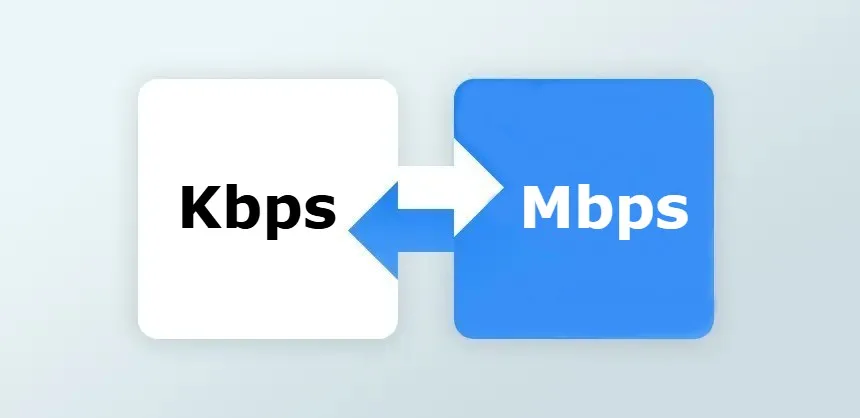Kbps to Mbps Converter - Convert Kilobits to Megabits Online
Convert between Kilobits per second (Kbps) and Megabits per second (Mbps). Understand historical internet speeds, download times, and real-world performance from different eras.
Enter your Kbps value
Conversion Results
Enter Kbps value to calculate conversion and historical analysis
Related & Other Popular Converters
It can be difficult to understand internet speed, especially when you see Kbps and Mbps referenced. This Kbps to Mbps Converter allows you to convert Kbps to Mbps quickly and easily. Whether you're measuring broadband speed, constructing a network, or evaluating data rates, you can receive instant and accurate conversions for your entire conversion.

What is Kbps and Mbps?
Before you can convert Kbps to Mbps, it's important to note the meaning:
In short, 1 Mbps = 1000 Kbps (Decimal standard), commonly used in networking and internet speed measurements.
If you're asking "which is faster - Kbps or Mbps", the answer is simple: Mbps represent higher speed and greater bandwidth; this is why most modern internet connections are rated in Mbps or even Gbps.
How to Convert Kbps to Mbps
The formula to convert Kbps to Mbps is very simple:
Mbps = Kbps / 1000
For example:
You can utilize the same principle to change internet speed from Kbps to Mbps. Our Kbps to Mbps Converter does this for you automatically and you will see results in milliseconds.
Kbps vs Mbps: What's the Difference?
| Feature | Kbps | Mbps |
|---|---|---|
| Full Form | Kilobits per second | Megabits per second |
| Conversion | 1 Mbps = 1000 Kbps | 1 Kbps = 0.001 Mbps |
| Common Use | Older internet connections | Modern broadband and fiber |
| Speed Range | Slower (e.g., 56 Kbps Dial-up) | Faster (e.g., 100 Mbps broadband) |
The difference between Kbps vs Mbps is simply a difference of scale - Mbps is approximately 1000 times faster than Kbs, allowing you to stream smoothly and download faster during better online experiences.
Why use our Kbps to Mbps Converter?
This tool has been used by thousands of users everywhere to change Kbps to Mbps and understand how different internet speed is observable at work, during streaming, or downloading.
Practical Use Cases
Regardless of your use case, the Kbps to Mbps Converter will meet your needs for digital speed conversions.
Whether you're comparing Kbps vs Mbps or are trying to convert Kbps to Mbps for a report, our Kbps to Mbps Converter is the perfect tool for you to generate accurate, quick, and simple results. It is great to be used by everyone who deals with data speeds - students, IT professionals, or average users checking in on your internet speed.
Start converting now, and understand your network speed better!
FAQs
1 Mbps = 1000 Kbps, since this is the decimal standard typically used in internet speeds.
To convert Kbps to Mbps, take the Kbps value divided by 1000. Example: 2500 Kbps ÷ 1000 = 2.5 Mbps.
Mbps is faster, as it transfers a greater amount of data each second. This makes Mbps better for HD streaming, gaming, and high-speed browsing.
The Decimal standard (1 mbps = 1000 kbps) is used in networking, while the Binary standard (1 mbps = 1024 kbps) is used by most computer-related applications.
You will need to run an online speed test - there are many testified speed test tools that measure your speed and then directly display that measurement in mbps.
512 kbps used to be typical for basic browsing, but by today's standards, 512 kbps is rather slow. Typical broadband connections start at about 10-100 mbps or higher for smooth reading and enjoy usage.